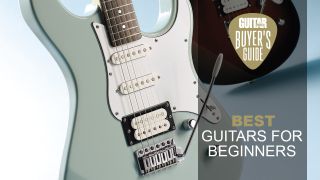Learning guitar is a lifelong journey. Unlike a videogame or television series, there’s no ‘completing’ the guitar. We’re 20+ years in and feel like we’re only scratching the surface of what’s possible with the instrument. We also appreciate it’s difficult to get started, which is why new players need one of the best guitars for beginners. Getting a racing start on the instrument ensures you’ll keep pushing through that difficult first phase, gaining an invaluable hobby and potentially even a career in music.
The world of beginner guitars is a bit of a minefield. There are many cheap guitars out there that come with shoddy finishes, sharp frets, warped necks, and subpar hardware. Thankfully for you, we’ve trawled through a huge amount of instruments to bring you the best playing, highest quality guitars that will ensure new players keep on coming back for more.
If you’re looking for some more information to help you make a purchase, then head down to the buying advice section at the end of the article. To start looking at the best guitars for beginners, keep scrolling to see our top picks.
Best guitars for beginners: Guitar World’s Choice
If you’re after an electric guitar, look no further than the Squier Bullet Mustang. Its short scale makes it great for younger players and its build quality is backed by one of the biggest brands in the business in Fender, so you know you’re getting a guitar that will stand the test of time. Two powerful humbucker pickups ensure a fantastic amplified sound and it’s a real looker too.
If you need something full-size, we’d go for the Yamaha Pacifica 112V. The Pacifica range has been the go-to for beginner guitar players for a long time now, thanks to its excellent playability and versatile pickup configuration. It’s a guitar that will last you well beyond your first chords and will take new players right the way to their first shows.
Going the acoustic guitar route for your first instrument? Well, you need to have a look at a legend in the beginner acoustic guitar game in the Yamaha FG800. One of the most popular acoustic guitars ever made, it’s got an excellent tonal balance and lovely playability making it a great acoustic even for intermediate players.
Best guitars for beginners: Electrics

The Squier Bullet Mustang is a great electric guitar for beginners, but it’s arguably the perfect electric guitar for younger beginners. The shorter scale length – 24” – means it isn’t too taxing on small hands, yet plug this thing in and it can make a heck of a racket. In a good way, of course.
The choice of basswood for the body makes for a very lightweight guitar, meaning you can concentrate on improving your skills without feeling like you’re wrestling a big block of wood, and the two humbuckers are ideal for playing big, punky chords and riffs.

The Yamaha Pacifica 112V has been the go-to guitar for beginners for over two decades. And for good reason; by combining grown-up design with all the tonal versatility a young learner would need, Yamaha has created a near-perfect package. The bridge humbucker allows you to steer into heavier styles of music, yet the two single coils at the middle and neck allow for different flavours of sound.
What’s always impressed with the Pacifica line is the way they grow with you; sure, there are cheaper guitars to learn on but, as you progress, you’ll find their shortcomings holding you back. The Pacifica 112, on the other hand, has been designed as a grown-up guitar with all the features you’ll need from the start.

Les Paul style guitars are a huge part of the rich tapestry of popular music, and with the Epiphone Les Paul Special you can join a pretty exclusive club. Everyone from Slash to Jimmy Page has famously played a Les Paul, drawn to its simple but effective blueprint of two meaty humbuckers, a solid body and plenty of attitude.
The Les Paul Special favours a poplar body, rather than Mahogany, which keeps costs and weight down, but this is still a guitar which can sing through an overdriven guitar amp.

Not everyone who decided to learn the guitar wants to learn on an entry-level model. We all have to work our way up to the elite tier, sure, but there’s a lot to be said for selecting something a little higher quality to begin your playing journey. The Squier Classic Vibe 50s Stratocaster is a superb choice in this regard, with its era-specific appointments and vintage hardware pointing to a very attractive guitar indeed.
Look past the aesthetics, however, and you’ll find a comfortable, easy to play instrument which has enough tonal versatility to cover a lot of bases. It’s not the cheapest on this list, but it’s easily one of the highest quality models at this price point.

While many players learn the guitar in order to emulate their playing heroes and, as a result, naturally gravitate towards a specific style of guitar, there are others who maybe don’t want to follow the crowd. With the Gretsch G5426 there is an ideal guitar for beginners which will see you right far beyond those first few scales you learn.
You’ll notice immediately that this is a guitar which brings a different energy to the table. The two humbuckers ensure you can create a bold, rich sound - aided by the chambered body - while the overall build quality is high enough to ensure this is a guitar which will grow with you as you develop. The sparkly silver colour won’t be to everyone’s taste, but underneath it is a very capable guitar with bags of character and a sound all of its own.
Best beginner guitars: Acoustics

When you think of acoustic guitars at this level, you may assume they’re all cheap, nylon-strung models which fall apart after a month. And, while these guitars do exist, we’d advise steering clear. Especially when there are proper, affordable alternatives like the Yamaha FG800 on the market.
The FG800 is a dreadnought-style guitar, so it has a large, deep body which, in conjunction with the steel strings, projects a gloriously rich tone with loads of character. This is a guitar you can take your first steps on, and we are confident it will stay with you long into the future.

Classical (and Spanish) style acoustic guitars differ from steel-string models in a few key ways. For a start, they employ nylon strings which are easier for beginners to get to grips with - literally - but also deliver a smoother, more mellow sound. They often come in reduced sizes too, making them ideal for young players starting out. The Epiphone PRO-1 is a great option for beginners because it has that small scale length, and also a reduced width at the top of the guitar to make tricky chord shapes easier to execute.
This is definitely a beginner’s guitar, and one you could conceivably outgrow in a short space of time, but as a tool to get you up and running the PRO-1 is well worth consideration. If a nylon-stringed guitar sounds right for you, we’d recommend reading our dedicated guide to the best beginner classic guita

An electro-acoustic guitar is a great option for the new player looking to the future, as it gives you the volume required to play your first shows or jam with others. The Ibanez PC12MHCE is a fantastic choice for the first-timer thanks to its combination of great sound and excellent value for money.
It’s got a nice midrange tonality, so will work just as well for your first chords as it does for more complex fingerpicking. The cutaway gives great upper fret access, and the whole neck feels really smooth to play, a feature of many Ibanez guitars.
The built-in electronics offer a nice and transparent tone when plugged in, plus you get a built-in tuner to ensure you’re always ready to rock. An excellent option for the beginner guitarist who wants to move on to live performances.


While we’ve included some small-scale guitars here, the Yamaha JR1 is arguably the one to beat when it comes to being the best guitar for kids. This ¾ sized acoustic features a scaled-down body and neck, so it’s easy for smaller hands to work on their chords and develop those good playing habits that will stand them in good stead for the future.
As well as younger learners, the Yamaha JR1 makes a great travel guitar, aided by the included gig bag, making this a decent all-rounder for beginners and more established players.
Best guitars for beginners: Buying advice

Buying your first guitar is a big step, so you need to make sure it’s the right one for you. There are loads of different choices you can make so arming yourself with the right knowledge is key to ensuring you buy the right instrument for you.
Should I learn acoustic guitar or electric guitar first?
Traditionally beginner players began their journey on the acoustic guitar, but just because something is traditional doesn’t mean it’s right for you. We personally began learning on an acoustic guitar, but that was over twenty years ago and since then a lot has changed. Which instrument you start on is no longer the taboo subject it once was, so if either appeal to you more then go for it!
We reckon the electric guitar is easier to learn on for a few reasons, first of all, the body is nice and thin, so the guitar will be closer to you when you play. Typically electric guitar necks are thinner than their acoustic counterparts, thus you’ll find fretting chords easier. Finally, electric guitar strings are thinner than acoustic guitar strings, so don’t require the same amount of hand strength to press down.
However, we will caveat this with a few things when it comes to learning on an acoustic guitar for beginners. Exactly because they are more difficult to play, starting with acoustic will enable you to progress more quickly, developing a stronger core of hand strength and dexterity. Just like the famous slogan, ‘train hard, fight easy’ taking the tougher option when you initially begin to play will have you reaping the rewards later down the line.
What size guitar should I get?
Electric guitars have different body shapes, but in terms of size, they tend to be pretty similar across the board. Electric guitars usually have thin bodies which means they’re considered relatively small, especially when compared to some acoustic guitar body types. You can get a short-scale guitar, which has a smaller length between the bridge and the headstock, making it easier for younger players and those with smaller dimensions to get to grips with.
Acoustic guitar body sizes are numerous and some of them are big enough that even a fully grown adult can struggle to handle them. Dreadnoughts and jumbos are the biggest size guitars, whereas parlor and grand auditorium styles offer a smaller size for younger players. You can also get ½ and ¾ size guitars, which are great for very young players, offering a smaller body size and scale length.

How much should I spend on my first guitar?
All of the guitars here are under $/£500, and many of them are below the $/£300 mark. We wouldn’t recommend spending above this on a first instrument, as it’ll be an expensive mistake if you decide that the guitar isn’t for you after all! Instruments around the $/£300 mark are pretty much guaranteed to be great quality, and so long as you’re buying from a reputable brand, those that fall lower than this price point will still do the job just fine.
Do I need any accessories like a tuner or a strap?
We would definitely recommend getting a clip-on tuner alongside your first guitar purchase. It’s one of the most important accessories and you’ll get a lot of use out of it. No guitarist worth their salt will be caught without a tuner, and it also helps you understand your first bits of music theory too.
Other accessories like guitar straps and guitar cables are instrument dependent. Most acoustic guitars are usable without a guitar strap thanks to their large body size. Electric guitars on the other hand can be unwieldy to play sitting down without a strap, so it’s worth investing in one if you have an electric as your first guitar.
If you’re going the electric guitar route, then you’ll have to get yourself a beginner guitar amp to go with it, as well as a guitar cable to plug it in. These are worth bearing in mind when you’re budgeting for your first purchase, as your guitar won’t be at its best without them.

Should I take lessons before I buy a guitar?
Having your own guitar is incredibly important whilst you’re learning. If you’re taking lessons you’ll need to practice what you’ve learned, so we’d definitely advise buying a guitar to use alongside your lessons. If you’re worried about the cost of lessons, don’t worry because there are loads of great online guitar lessons platforms you can use to learn from the comfort of your own, as well as at your own pace.
You can make savings on guitar lessons online with our Guitar World exclusive promo codes below:
Related buying guides
You can trust Guitar World Our expert reviewers spend hours testing and comparing guitar products so you can choose the best for you. Find out more about how we test.
- The best pedalboards for organizing your guitar effects
- Best guitar picks: find the right plectrums for you
- 12 killer cheap guitar pedals you need to try
- Practice in peace with the best headphones for guitar amps
- Meet the best electric guitars under $1,000
- These are the best acoustic guitars under $500






